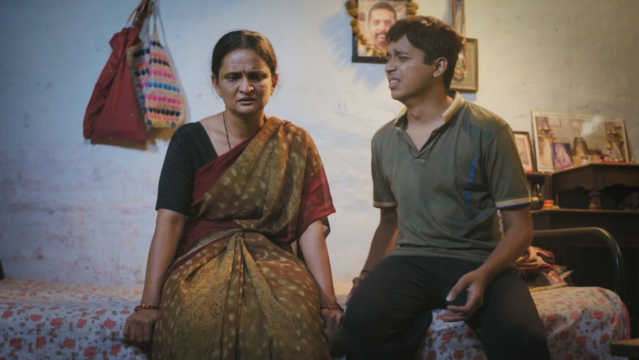
Keyur Seta
Mumbai, 31 Aug 2018 19:32 IST
The film starring Subodh Bhave and Trupti Toradmal does not do justice to its interesting story.

The trend of adapting hit plays into films seems to be growing in mainstream Marathi cinema. After Katyar Kaljat Ghusli (2015) and Natsamrat (2016), director Swapna Waghmare Joshi adapts the acclaimed play Savita Damodar Paranjpe for the big screen.
Whether this film, produced by John Abraham, achieves the same kind of success at the box office as the other two will be known later. But Savita Damodar Paranjpe does remind you of Priyadarshan’s Hindi film Bhool Bhulaiya (2007), a remake of director Fazil’s Malayalam hit Manichitrathazhu (1993), though the films are of different genres. While the Malayalam film and its Hindi remake were horror comedies, SDP is a serious mystery thriller.
The year is 1988. Sharad Abhyankar (Subodh Bhave) visits the chawl in Mumbai where he grew up before becoming a successful author. He is in love with his architect wife Kusum (Trupti Toradmal) with whom he lives a luxurious life. However, their lives are far from happy. Kusum has been having phases during which she screams and behaves like an evil person. During such phases, she reveals her name to be Savita Damodar Paranjpe. The couple try any number of remedies, but none work.
Sharad calls his relative Ashok (Raqesh Bapat), an expert in palmistry. As soon as he sees Kusum’s hand, he becomes sure she is possessed by an evil spirit. But Sharad’s family doctor believes this is a clear case of multiple personality disorder.
What is the true reason for Kusum’s behaviour? Who is Savita Damodar Paranjpe?
The positive aspect about the film is the interesting and thrilling basic plot about a woman getting mysterious attacks without apparent medical cause. For a while, you do wonder what the problem could be.
But a gripping story requires quality narration. This is where Savita Damodar Paranjpe suffers. The structure of the story hurts the film the most. For some reason, the writers reveal the entire mystery and suspense, including the back story, in the first 45 minutes. This ruins the fun, especially if you haven’t seen the play.
With the mystery revealed, the story in the second half just limps along to the climax, which also doesn’t shake you. And the manner of ending the story, keeping a sequel in mind, doesn’t work.
While this reviewer hasn’t seen the play, the flashbacks do not appear convincing. The culprit is the confused characterization of Sharad in the flashbacks. You are also confused by the motto of another important character, which can’t be revealed as it will be a spoiler.
Cinematographer Prasad Bhende’s brilliant work keeps you engaged even when the film ceases to be exciting. You can’t help but notice his artistry though almost the entire film is shot indoors. He leaves a mark even in those few moments that are shot outside. The background score, a vital area in such films, succeeds in generating a thrill, though it shouldn’t have been so loud on occasion.
The track ‘Lapa Chhupi’ is not only impressive, but it also becomes a perfect haunting theme song for the film. Nisha Upadhyaya Kapadia’s melodious voice stays with you even after the film. The rest of the songs are average.
Trupti Toradmal’s performance needed to be convincing and that is exactly what she has delivered. From being emotional to being crazy, the daughter of the late Marathi actor-writer Madhukar Toradmal, does it all confidently. The voice used whenever she gets the attacks is weird though. It reminds you of the hoarse narrator from the Hindi movie Rakht Charitra (2010).
Subobh Bhave plays his part well, but we have seen better performances from him. Raqesh Bapat could have been more expressive but he is good nevertheless. Pallavi Patil is promising and deserves more roles. Savita Prabhune does not have much to do. Hemangi Kavi has a brief but important part that she performs with conviction. If only Savita Damodar Paranjpe had been as convincing.
You might also like

Review Marathi
Samaira review: This well-intentioned travel drama suffers from a dull script
Actor Rishi Deshpande's directorial debut doesn't rise as much as its performances. ...

Review Marathi
Goshta Arjunchi review: Triggering conversations about mental health
Anupam Barve’s short film urges people to talk to their families about what they are going...

Review Marathi
Ekda Kaay Zala review: Sumeet Raghvan impresses in a film that does not use its full potential
Directed by Dr Saleel Kulkarni, the film has a fine act by child artiste Arjun Purnapatre....

